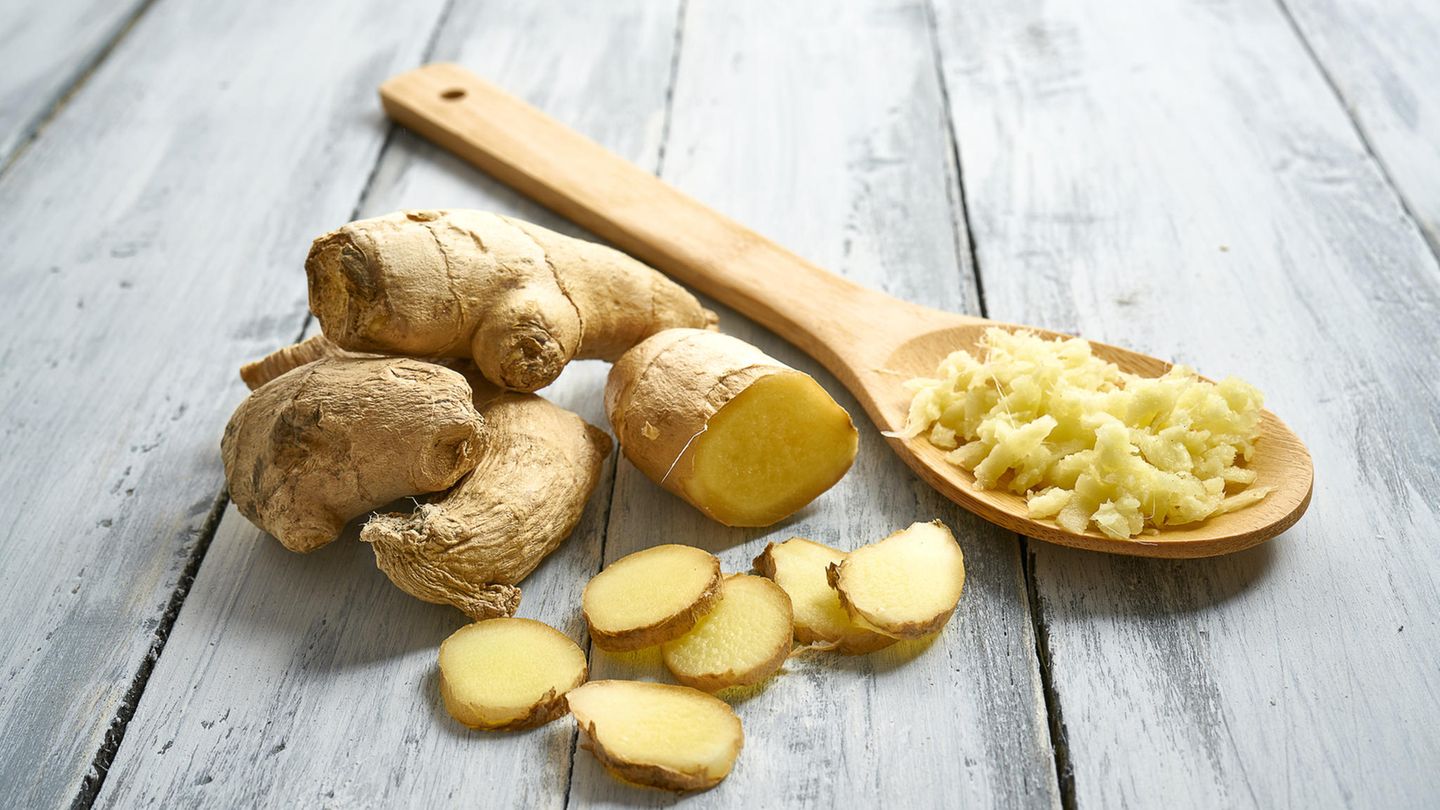A ginger shot in the morning banishes health worries and concerns. The tuber is praised as a cure-all. However, excessive consumption can even be counterproductive.
Ginger is considered a superfood, a miracle tuber. It is said to have wonderful powers. It has been an integral part of traditional Chinese medicine for thousands of years. And in the West, too, more and more people are turning to the healthy tuber, which is full of essential oils such as gingerol and schogaol. Ginger is said to relieve headaches and counteract colds. If your stomach is rumbling, it soothes the stomach and intestines. It is even used as an aphrodisiac. The list of uses is long. And yet experts advise only consuming ginger in moderation and not exceeding a daily dose of four to five grams, explains Daniela Krehl. She is a food and nutrition consultant at the Bavarian Consumer Center. Excessive consumption of ginger can have a detrimental effect on your health and can even be dangerous.
1. When ginger upsets your stomach
Digestive problems? Ginger stimulates digestion, and the intestinal flora also benefits from the tuber. These are the positive effects. However, not everyone tolerates ginger so well, and even the opposite effects are possible – heartburn, stomach pain, flatulence, diarrhea. This can be read in a study by the University of Maryland. People with sensitive stomachs in particular should avoid highly concentrated ginger varieties. “The spiciness of the ingredients stimulates the stomach immensely, which attacks the stomach lining,” explains Johannes Georg Wechsler. He is a specialist in internal medicine and nutritional medicine and president of the Federal Association of German Nutritional Medicine. In the medium term, this can lead to gastrointestinal complaints, which is why ginger should ideally not be consumed continuously, but only in phases.
Cough, runny nose, fever
This is what science says: This is how home remedies work best for colds
2. Ginger, the blood thinner
Ginger promotes blood circulation. That’s great. However, this positive effect can turn into a negative one, for example during menstruation. Although ginger is said to be a suitable remedy for the symptoms, the opposite is also possible. Both bleeding and other symptoms can be made worse by eating ginger. Ginger should also be avoided before operations due to its blood-thinning properties. Ginger also has an anticoagulant effect. Although ginger has a reputation for helping with morning sickness, there is also discussion about whether ginger can possibly trigger premature labor. However, there is still no clear scientific evidence for this. The “Embryotox” information service at the Charité in Berlin writes: “Several clinical studies with over 900 pregnant women showed no indication of an increased risk of malformations or miscarriage.” Ginger can be taken in normal doses during all phases of pregnancy.
3. Ginger consumption during a cold
Ginger contains spicy substances. Although they are not as intense as chili, ginger can also irritate the mucous membranes in the mouth, which can lead to a “burning” sensation, among other things. Even though many people drink ginger tea when they have a cold, as it is supposed to help with coughs and colds, this can be counterproductive. Ginger irritates the mucous membranes even more. Even highly concentrated ginger products are no help in this case. Organic ginger does not usually need to be peeled when it is made into tea. If it is imported ginger, for example from China, the situation is different. “In this case, the peels can contain harmful substances such as pesticides, which is why the ginger must be peeled,” explains Krehl.
4. The gall is sore
The bile also reacts to ginger, and may then produce more fluid. Anyone who is prone to gallstones should therefore consume the root with caution.
5. Interaction of ginger with medications
As already mentioned, ginger has an anti-coagulant effect. So anyone taking medication that also thins the blood should not take ginger in addition. The same applies to so-called 5HT3 antagonists such as ondansetron. This is used against nausea and prevents vomiting. Ginger is also said to have such effects. It is possible that a combination of ginger and such medications can increase the effects – both positive and negative.
Source: , , , with material from Dpa
Source: Stern
I’m Caroline, a journalist and author for 24 Hours Worlds. I specialize in health-related news and stories, bringing real-world impact to readers across the globe. With my experience in journalism and writing in both print and online formats, I strive to provide reliable information that resonates with audiences from all walks of life.




